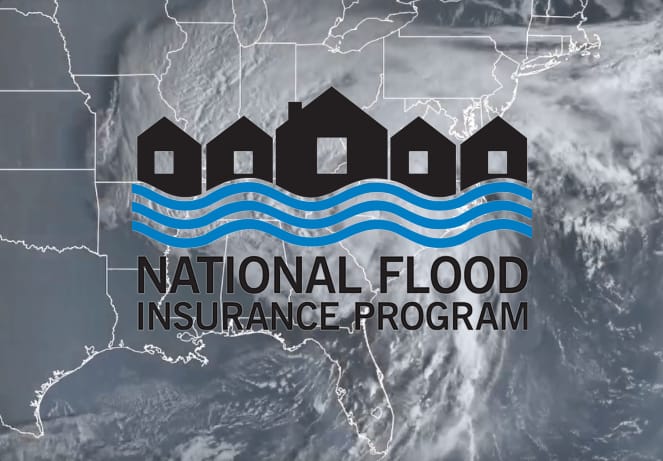NFIP’s Helene loss estimate rises to $6.75bn. Two cat bonds extended with partial repayment

Artemis has learned that FEMA has increased its estimate for National Flood Insurance Program (NFIP) losses from hurricane Helene, raising the figure to $6.75 billion and as a result two FloodSmart Re catastrophe bond tranches have had their maturity dates extended, with partial repayments of principal to be made.
The U.S. Federal Emergency Management Agency’s (FEMA) initial estimate for NFIP claims from hurricane Helene’s flooding was put in a range from $3.5 billion to as much as $7 billion back in November.
Now, sources have told us that the NFIP’s ultimate net loss from the hurricane event has been updated to an estimate for $6.75 billion of losses to the flood insurance program.
As a result, this estimate is at a level that could cause some small losses to one of the FloodSmart Re catastrophe bond tranches, while it is also nearing the attachment point for FEMA’s traditional flood reinsurance program.
The maturity extensions relate to the FloodSmart Re Ltd. (Series 2022-1) cat bond issuance from February 2022.
That cat bond was scheduled to mature in February 2025, but with FEMA’s estimate for hurricane Helene losses to the NFIP now at $6.75 billion, the decision has been taken to extend maturity for two of the three tranches of this FloodSmart Re 2022-1 cat bond.
This cat bond featured three tranches of notes and the extensions of maturity only apply to the two riskier tranches of notes.
A $325 million Class A tranche of notes had an initial attachment point at $9 billion of losses to the NFIP, which we understand is now a bit higher after resets, so these notes appear safe and are likely to mature on schedule in late February and return their capital to investors, we hear.
But a $100 million Class B tranche of the FloodSmart Re 2022-1 cat bond have an attachment at around the $7.4 billion mark (it was $7bn at issuance), we understand, which means they are closer to the current UNL estimate of $6.75 billion for the NFIP. Once an estimate rises above a certain percentage of the attachment, it allows a sponsor to extend maturity for cat bond notes to retain the coverage and cover any future potential loss developments.
With this Class B tranche of notes, we’re told some $80.9 million of the outstanding principal is set to be repaid to investors, leaving just $19.1 million retained and with its maturity date set to be extended, to allow for development of the NFIP’s hurricane Helene flood losses.
The riskiest layer of this FloodSmart Re 2022-1 cat bond is the $25 million Class C tranche of notes. These have an attachment at around the $6.52 billion level (it was $6bn at issuance), which is already lower than the latest NFIP loss estimate for Helene.
At this stage no loss notice has been filed, we’re told, but these notes have also had their maturity date extended out to allow for ongoing development, while with the Class C notes just $2.7 million of the original $25 million of principal is set to be repaid to investors, leaving $22.3 million outstanding and still on-risk for a possible loss due to Helene.
In recent cat bond pricing sheets, the FloodSmart Re 2022-1 Class B notes were marked for bids of around 90 cents on the dollar, while the Class C notes were marked at around 50 cents. It’s likely these marks will decline further once this new loss estimate and extension/repayment information is factored in.
It’s important to note that the $6.75 billion latest estimate for the NFIP’s ultimate net loss from hurricane Helene is just that, an estimate, so there is no guarantee losses will be faced. Estimates can often decline, just as readily as they rise.
But, with that figure being above the attachment point for the Class C notes and approaching the attachment for the B’s, it appears there is a growing chance that some principal losses may occur, at least to the Class C tranche.
It’s also worth noting that the reason for the extension is due to the impending maturity of this particular FloodSmart Re cat bond.
Another cat bond in the series, the FloodSmart Re Ltd. (Series 2023-1) deal, has a $50 million Class B tranche of notes that also had an initial attachment point at $7 billion of NFIP losses from a named storm related flood event. We aren’t certain where the attachment sits now, after annual resets, but if it remains the same then these notes seem to be as at-risk from Helene losses as the 2022-1 Class B tranche.
However, with the 2023-1 FloodSmart Re cat bond not set for maturity until March 2026, there has been no need to issue any extension notice for them, given they remain on-risk to cover any additional loss development (depending on their attachment point, of course).
Finally, as we said above, the NFIP’s traditional reinsurance tower for calendar year 2024 provides $619.5 million in coverage above a $7 billion attachment point.
As a result, with the hurricane Helene loss estimate now said to be at $6.75 billion, the NFIP’s traditional reinsurance tower could be at-risk should the UNL creep further and end up higher.
It’s worth noting though, that the traditional reinsurance only covers 8.9125% of losses between $7 billion and $9 billion for the NFIP, so any erosion of this and losses to reinsurers are likely to be minimal at this stage.
We’ll update you as and when any further information emerges.
Read all about FEMA’s NFIP catastrophe bonds under the FloodSmart Re series of deals.
We’ve included the FloodSmart Re 2022-1 issuance in our Directory of catastrophe bonds facing losses, deemed at risk, or already paid out.






